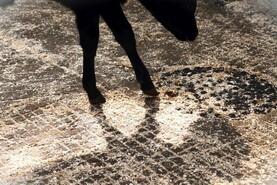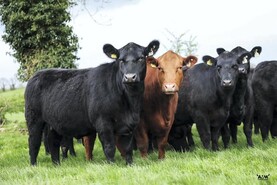Grass
Most farms have between a half and two-thirds more grass in the fields than normal. This is a good complaint, but it will cause problems if grass is not managed properly. The challenge will be to get enough ground grazed in the first four weeks so as to have enough grass coming back for the first week of the second rotation. The normal target for those in the southern half of the country is to have 30% of the farm grazed in February. The target is a week later further north. With so much grass around, getting the fields grazed will be a challenge as there aren’t enough light covers to put cows into.
Cows should definitely be put out day and night when conditions allow. Meal feeding levels should be reduced compared to what is normally fed in February. If cows can be let out day and night, they’ll get away without any meal, but feeding 2kg is useful for getting minerals and vitamins into them. The aim is to be tight for grass in late March, but not to let average farm cover go below 500kg/ha. This is the best position to be in. My fear is farmers will be slow to go grazing and have loads of grass in March, but will be very tight for grass in April as there will be very little grass coming back from what was grazed. Remember, you need to graze it if you want to grow it.
Milking parlour
Now is the time to do any final checks on the milking parlour and bulk tank before calving starts. Get the milking machine technician to service the plant and get pulsation tested. Liners should be changed now too, especially if the machine has been idle since before Christmas. Give the bulk tank a couple of acid and detergent washes before you put milk into the tank. The milk from the first milking should be above the agitator blade to ensure it cools properly, gets circulated and doesn’t freeze. Milk that freezes and then thaws will be high in TBC. Sticking with milk, now is the time to check and change teats on calf feeders.
Power of attorney
After falling through the roof of a shed, Donal Dempsey was told by the doctors that he was lucky as he could have died, or worse. The doctors figured that a fate worse than death was to be left with life-limiting brain injuries. Karen and Donal Dempsey spoke at the Positive Farmers Conference last week. They implored everyone to get an enduring power of attorney (EPOA). Donal has mostly recovered from his injuries, but if he didn’t, the operation of the farm would have been in limbo as Donal didn’t have an EPOA in place. Karen wouldn’t have any legal right to make decisions around what to do with land, or access to money, even though it was held in joint accounts. An EPOA is as important as a will.
It enables a person that you nominate to make decisions on your behalf, if you are unable to make them yourself. Consider getting a health check-up over the next few weeks to make sure you are fit and healthy and ready for the busy spring period.






 This is a subscriber-only article
This is a subscriber-only article









SHARING OPTIONS: